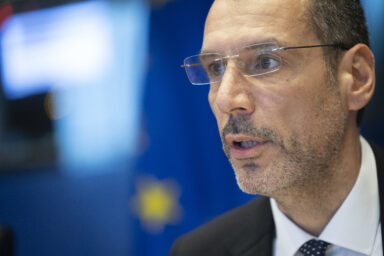The European Union plans to remove the United Arab Emirates from its list of countries that pose a high-risk for money-laundering, something the Gulf country has been pushing to happen.
The European Commission, the bloc’s executive arm, took the UAE off its list of “high-risk jurisdictions presenting strategic deficiencies in their national anti-money laundering and countering the financing of terrorism (AML/CFT) regimes,” according to an official statement. The change still needs the go-ahead from EU member states and the European Parliament, which last year blocked the UAE’s removal from the list.
Following Paris
The EU’s financial services commissioner, Maria Luís Albuquerque, said the move “reiterates our strong commitment to aligning with international standards”. The EU regularly assesses third countries’ efforts against money laundering and the financing of international terrorism and has yet to drop the UAE from its black list. That’s despite the Paris-based Financial Action Task Force — a global body — removing the UAE from its “gray list” last year.
The removal would satisfy a demand from the UAE, which has previously raised its concerns about its inclusion on the list. It comes as the two parties recently agreed to launch free trade negotiations.
I do not understand how the UAE is still on the black list. — Abdulla bin Touq Al Marri, UAE Economy Minister
Other countries taken off the the EU’s list were: Barbados, Gibraltar, Jamaica, Panama, the Philippines, Senegal and Uganda. Countries added were: Algeria, Angola, Cote d’Ivoire, Kenya, Laos, Lebanon, Monaco, Namibia, Nepal and Venezuela.
The UAE was very nervous about the situation. The country’s officials have repeatedly expressed concern about the European Union keeping it on the list. “The question of the EU black list, this is a question for them. I do not understand how the UAE is still on the black list,” said Economy Minister Abdulla bin Touq Al Marri in a January interview at the World Economic Forum in Davos, Switzerland.
You might be interested
Other concerns at play
The reasons for the Commission’s move are not entirely clear. It is not obvious that UAE has markedly improved its behaviour. For instance, Mr Al Marri has often reiterated that while the UAE has introduced corporate tax, it has no plans to start income taxes. “There’s a lot of speculation on that,” he said. “It’s not on the table. It’s not in the rooms of discussions. It’s not being discussed in the meetings. It’s not coming anytime soon.”
What has changed is Europe’s energy situation, however. The bloc is trying to wean itself off its notorious addiction to Russian energy, a task not quite completed yet. The UAE, an OPEC member, ships little of its crude to Europe, according to data compiled by Bloomberg. But it is planning to export more of its liquefied natural gas there. Qatar, one of the world’s biggest LNG producers, has voiced similar criticism about the EU’s climate directives and said those may result in less fuel being sent to the bloc.











